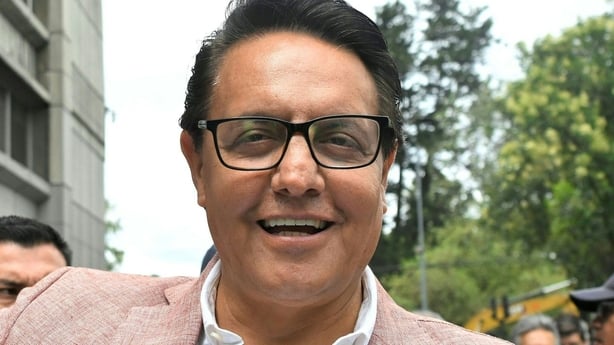Two former members of parliament - leftist Luisa Gonzalez and banana industry heir Daniel Noboa - will contest a run-off vote for Ecuador's presidency in October after coming top in the first round of voting.
Ms Gonzalez, a protégé of former president Rafael Correa who has promised to revive his social programmes, won 33% support.
Mr Noboa, son of prominent businessman and perennial presidential candidate Alvaro Noboa, was a surprise second-place with 24% of the vote.
Centre and centre-right candidates, including Mr Noboa, took over 45% of the vote.
He approaches the 15 October runoff as a relative favorite despite Ms Gonzalez's lead, though the vote is expected to be tight, according to analysts.
Mr Noboa, who seemingly gained support after performing well in the only televised debate of the campaign, was a member of parliament until current President Guillermo Lasso dissolved the national assembly and called early elections.
His campaign has focused on job creation, tax incentives for new businesses and jail sentences for serious tax evasion.
Ms Gonzalez has promised to free up $2.5 billion (€2.3bn) from international reserves to bolster Ecuador's economy and bring back million-dollar social initiatives that Mr Correa implemented during his decade in power.
The contest was overshadowed by the assassination of anti-corruption candidate Fernando Villavicencio earlier this month.
The crime is under investigation, but Mr Villavicencio, who was replaced as a candidate by his friend and fellow investigative journalist Christian Zurita, came third with 16%.
His name appeared on the ballot papers because they were printed before his murder.

Sharp increases in crime, which the current government blames on drug gangs, and the struggling economy, whose woes have caused a rise in unemployment and migration, were the top concerns among voters.
Though Mr Noboa is likely to look for alliances with candidates who have been eliminated, any potential victory will depend on how well he articulates policy proposals, said political analyst Alfredo Espinosa.
"Noboa has tried to sell himself as a businessman and a young technocrat," said Mr Espinosa.
"If he can do that same exercise with the proposals of the (other) candidates that will give his rhetoric much more meaning.
"Politics is not comparable to managing a private business, it means generating consensus, generating spaces for dialogue."
Ms Gonzalez, backed by Mr Correa's political machine and its loyalists, especially in working class sectors, is in a strong position as the "second round will be plagued with ideological content," the political analyst said.
Mr Correa's Citizens' Revolution party was leading a nearly complete count for seats in the national assembly, with about 39% support, while Mr Villavicencio's Construye party tallied 21% and Mr Noboa's National Democratic Action 14.7%.
Read more:
'We are afraid' - Ecuador votes on president
Ecuadoran presidential candidate shot dead after rally
Party of slain Ecuadoran candidate picks replacement
Suspects in Ecuador candidate assassination are Colombian
Also on the ballot were two environmental referendums that could block mining in a forest near Quito and development of an oil block in the Yasuni reserve in the Amazon.
The oil block referendum had 59% support, with almost 100% of ballot boxes counted, while a ban on mining in the Choco Andino forest near Quito was also winning with 68% support.
Advocates say the bans are necessary to protect nature, fight climate change and, in the case of the Yasuni vote, safeguard some Indigenous Waorani people who are voluntarily isolated.
Last week, Fitch cut Ecuador's foreign currency debt rating further into junk territory on financing risks from deteriorating fiscal accounts, with default "a real possibility."
The South American country has nearly $16 billion (€14.7bn) in debt, with the next payment not due until 2030.

